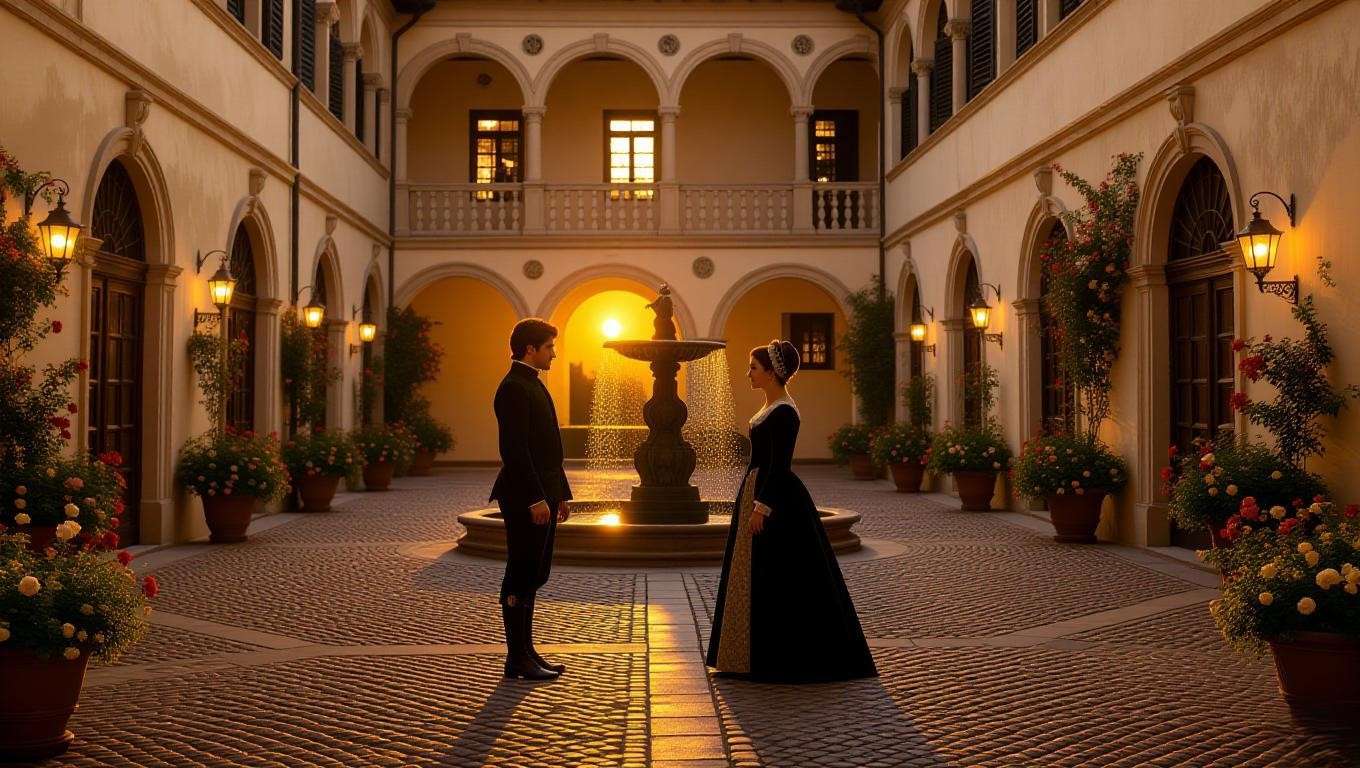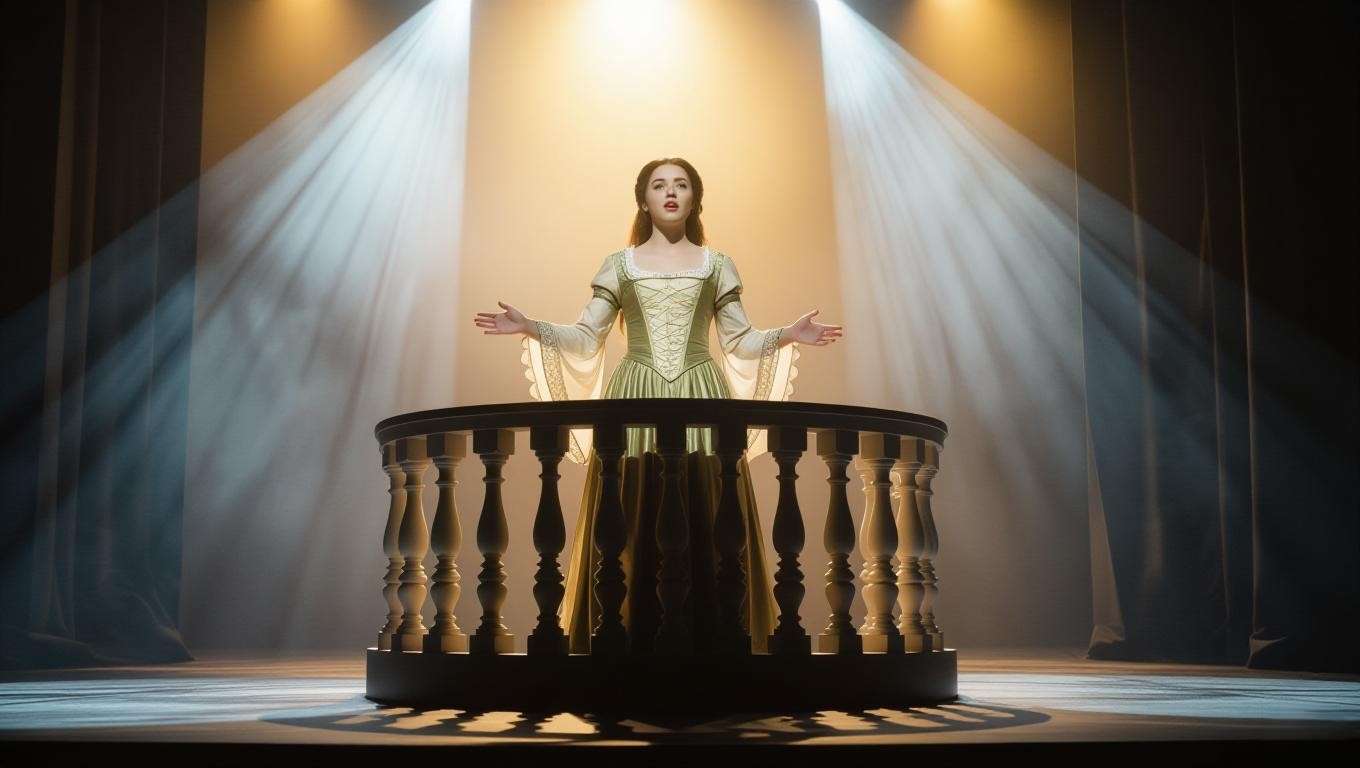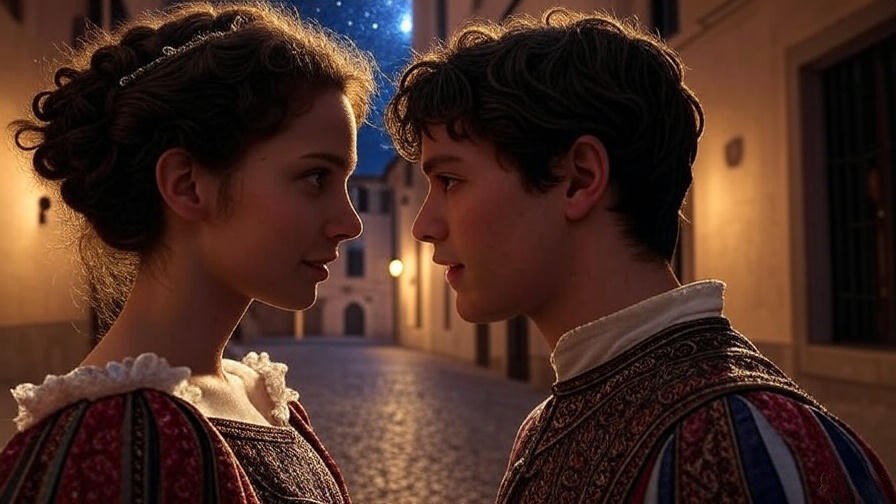Picture a young woman standing alone on her balcony, her heart racing with forbidden love, her words spilling into the night air with raw passion and desperate longing. This is Juliet Capulet, delivering one of the most iconic speeches in literary history—the Romeo and Juliet monologue by Juliet. For students, actors, educators, and Shakespeare enthusiasts, this moment in Romeo and Juliet is more than a romantic declaration; it’s a profound exploration of love, identity, and defiance. In this article, we dive deep into Juliet’s monologue from Act 2, Scene 2, offering a comprehensive analysis that uncovers its emotional depth, linguistic brilliance, and enduring relevance. Whether you’re studying the play, preparing for a performance, or simply seeking a deeper appreciation of Shakespeare’s genius, this guide will illuminate why Juliet’s words continue to captivate audiences worldwide.
As a Shakespeare scholar with years of experience analyzing his works for academic and theatrical audiences, I’ve crafted this article to provide expert insights while remaining accessible to all readers. Expect a detailed breakdown of the monologue’s context, language, themes, and practical applications, designed to answer your questions and spark your curiosity.
The Context of Juliet’s Monologue in Romeo and Juliet
Setting the Scene in Act 2, Scene 2 (The Balcony Scene)
Juliet’s monologue occurs in the famous balcony scene of Romeo and Juliet, a pivotal moment in Act 2, Scene 2. Unaware that Romeo is listening below, Juliet steps onto her balcony, wrestling with her newfound love for a man whose family name—Montague—makes him her enemy. The Capulet-Montague feud forms the backdrop of her internal conflict, creating a dramatic tension that fuels her words. This scene marks a turning point in the play, as Juliet’s private musings reveal her evolving character—from a dutiful daughter to a bold young woman willing to challenge fate for love.
The monologue captures Juliet’s vulnerability and courage as she grapples with the implications of loving Romeo. It’s a moment of unguarded honesty, contrasting with the formal exchanges elsewhere in the play. Understanding this context is crucial for appreciating the monologue’s emotional weight and its role in advancing the tragic narrative.
Historical and Cultural Background
To fully grasp Juliet’s monologue, we must consider the Elizabethan era’s views on love, marriage, and family duty. In Shakespeare’s time, marriage was often a strategic alliance, particularly for noble families like the Capulets. Juliet’s desire to love Romeo freely defies these norms, reflecting a tension between individual passion and societal expectation. Her words echo the Petrarchan love poetry popular in the Renaissance, which idealized unattainable love while celebrating its emotional intensity. Shakespeare draws on this tradition but grounds it in Juliet’s authentic voice, making her monologue both timeless and revolutionary.
This historical lens enriches our understanding of Juliet’s defiance. By rejecting the constraints of her family’s feud, she challenges the patriarchal structures of her time, a theme that resonates with modern audiences navigating their own societal pressures.
Textual Analysis of Juliet’s Monologue
Key Lines and Their Significance
Juliet’s monologue begins with the immortal line: “O Romeo, Romeo! Wherefore art thou Romeo?” Contrary to popular belief, “wherefore” does not mean “where” but “why.” Juliet is lamenting why Romeo must be a Montague, the name that stands between them. This opening sets the tone for her internal struggle, as she questions the arbitrary divisions of family and identity.
Let’s break down key lines:
- “Deny thy father and refuse thy name”: Juliet urges Romeo to reject his family identity, revealing her willingness to prioritize love over loyalty. This line underscores her agency and foreshadows her later defiance of her parents.
- “What’s in a name? That which we call a rose / By any other name would smell as sweet”: Here, Juliet challenges the power of names and labels, a radical idea in a society where family lineage defined one’s worth. The rose metaphor is both poetic and philosophical, inviting readers to question societal constructs.
- “So Romeo would, were he not Romeo call’d”: Juliet affirms that Romeo’s essence—his character and love—transcends his name, reinforcing the monologue’s theme of identity.
These lines reveal Juliet’s emotional and intellectual depth, blending passion with introspection in a way that captivates readers and performers alike.
Language and Literary Devices
Shakespeare’s mastery of language shines in Juliet’s monologue. Written in iambic pentameter, the speech mirrors the natural rhythm of speech while maintaining poetic elegance. The monologue is rich with literary devices:
- Metaphors: The rose metaphor encapsulates Juliet’s argument that essence matters more than labels, a universal truth that resonates beyond the play.
- Oxymorons: Juliet’s language reflects her conflicted state, echoing the play’s broader use of oxymorons like “loving hate” to convey the paradox of her situation.
- Imagery: References to the night and stars evoke a sense of intimacy and transcendence, aligning Juliet’s love with the cosmic and eternal.
These devices enhance the monologue’s emotional impact, making it a perfect blend of poetry and drama. For students and actors, analyzing these elements reveals Shakespeare’s craftsmanship and deepens their engagement with the text.
Emotional Depth and Character Insight
Juliet’s monologue is a window into her psyche, revealing a young woman caught between love and duty. At just 13, she displays remarkable courage by questioning the feud that defines her world. Her vulnerability—expressed in the private setting of the balcony—contrasts with her boldness, as she imagines a world where love transcends societal barriers. This duality makes Juliet a compelling character, neither wholly innocent nor fully rebellious, but a complex blend of both.
Her monologue also highlights her agency. Unlike the passive heroines of earlier literature, Juliet actively seeks to shape her destiny, a trait that sets her apart in Shakespeare’s canon. This depth makes her monologue a rich subject for analysis and performance, offering insights into her character and the play’s broader themes.
Juliet’s Monologue in Performance
Challenges for Actors
Performing Juliet’s monologue is a daunting task, requiring actors to balance passion, vulnerability, and intellectual depth. The challenge lies in conveying Juliet’s emotional intensity without veering into melodrama. Actors must navigate the monologue’s rapid shifts—from longing to frustration to hope—while maintaining authenticity. Key considerations include:
- Pacing: The monologue’s rhythm should reflect Juliet’s racing thoughts. Pausing after “wherefore art thou Romeo?” can emphasize her anguish.
- Tone: Actors must decide whether to lean into Juliet’s romantic fervor or her rational questioning of identity, depending on the production’s vision.
- Physicality: Since Juliet is unaware of Romeo’s presence, her movements should feel introspective, as if she’s speaking to herself or the night.
Rehearsing with a director or coach can help actors find the right balance, ensuring the monologue feels fresh and genuine.
Notable Performances
Juliet’s monologue has been brought to life in countless productions, each offering a unique interpretation. Claire Danes’ performance in Baz Luhrmann’s 1996 film Romeo + Juliet infuses the monologue with youthful intensity, set against a vibrant, modern backdrop. Olivia Hussey’s portrayal in Franco Zeffirelli’s 1968 adaptation, meanwhile, emphasizes Juliet’s innocence and poetic grace. These performances highlight the monologue’s versatility, allowing actors to explore different facets of Juliet’s character.
Theater directors often emphasize the monologue’s intimacy, staging it with minimal props to focus on Juliet’s words. Insights from directors like those at the Royal Shakespeare Company suggest that the key to a successful performance lies in capturing Juliet’s internal conflict, making her relatable to modern audiences.
Thematic Significance of the Monologue
Love vs. Social Constraints
Juliet’s monologue encapsulates the central theme of Romeo and Juliet: the tension between love and societal barriers. By questioning the significance of Romeo’s name, Juliet challenges the feud that divides their families, a conflict rooted in pride and tradition. Her words reflect a universal struggle—love’s power to transcend divisions, whether based on family, culture, or status. This theme resonates across centuries, making the monologue a touchstone for discussions about love’s challenges.
The monologue also ties into the play’s exploration of fate. Juliet’s wish for Romeo to “refuse thy name” foreshadows the tragic consequences of their inability to escape their identities, setting the stage for the play’s inevitable end.
Juliet’s Role as a Feminist Icon
Juliet’s monologue positions her as a proto-feminist figure, defying the patriarchal norms of her time. By prioritizing her love for Romeo over family loyalty, she asserts her agency in a society that expects her to obey her father’s wishes. Her intellectual engagement with the concept of names—challenging their power over identity—demonstrates a sophistication that belies her youth.
However, some scholars argue that Juliet’s agency is limited by her tragic fate, as she ultimately succumbs to the constraints of her world. This debate enriches the monologue’s significance, inviting readers to consider whether Juliet’s defiance makes her a feminist icon or a tragic victim of circumstance.
Educational Applications
Studying the Monologue in the Classroom
Juliet’s monologue is a staple in literature classrooms, offering rich opportunities for analysis and discussion. Teachers can engage students with the following activities:
- Discussion Prompts: Ask students to explore what Juliet’s monologue reveals about her character or how it reflects the play’s themes.
- Creative Exercises: Have students rewrite the monologue in modern language, helping them connect with its emotions.
- Group Analysis: Divide the class into groups to analyze different literary devices, fostering collaborative learning.
These activities make the monologue accessible while encouraging critical thinking and engagement with Shakespeare’s language.
Writing About Juliet’s Monologue
For students crafting essays, the monologue offers a wealth of topics. Sample thesis statements include:
- “Juliet’s monologue in Act 2, Scene 2 reveals her as a complex character who balances passion with intellectual insight.”
- “Shakespeare uses Juliet’s monologue to critique the societal constraints of Elizabethan England.”
Common pitfalls to avoid include misinterpreting “wherefore” as “where” or oversimplifying the monologue as purely romantic. Students should ground their arguments in textual evidence and consider the monologue’s broader context within the play.
Why Juliet’s Monologue Resonates Today
Universal Themes of Love and Identity
Juliet’s monologue remains a powerful touchstone for modern audiences because it grapples with timeless questions of love and identity. Her struggle to reconcile her feelings for Romeo with the societal barriers posed by their families mirrors contemporary challenges, such as navigating cultural, religious, or social divides in relationships. The question “What’s in a name?” resonates in discussions about identity, whether related to race, gender, or personal heritage. By challenging the arbitrary power of labels, Juliet speaks to anyone who has felt constrained by external expectations.
This universality makes the monologue a compelling subject for readers and performers alike. Its emotional rawness—Juliet’s blend of hope, frustration, and longing—transcends its Elizabethan origins, inviting audiences to reflect on their own experiences of love and self-discovery. For students, this connection to modern issues can make Shakespeare’s work feel immediate and relevant, bridging the gap between 16th-century drama and 21st-century life.
The Monologue’s Influence on Pop Culture
Juliet’s monologue has left an indelible mark on popular culture, cementing its status as a symbol of romantic love. References to “O Romeo, Romeo!” appear in films, TV shows, and literature, often evoking the passion and tragedy of young love. For example, the monologue is parodied in works like The Simpsons and quoted in romantic comedies, demonstrating its cultural staying power. Baz Luhrmann’s 1996 film Romeo + Juliet reimagined the balcony scene with a modern aesthetic, introducing Juliet’s words to a new generation.
Beyond direct references, the monologue’s themes inspire countless stories about star-crossed lovers, from West Side Story to young adult novels. Its influence underscores why Juliet’s words remain a touchstone for exploring love’s challenges, making it a vital part of Shakespeare’s legacy.
Expert Insights and Scholarly Perspectives
What Scholars Say About Juliet’s Monologue
Scholars have long celebrated Juliet’s monologue for its poetic and thematic richness. Renowned Shakespearean critic Harold Bloom praises Juliet’s “intellectual vitality,” arguing that her monologue reveals a mind as sharp as her heart is passionate. In Shakespeare: The Invention of the Human, Bloom notes that Juliet’s questioning of names reflects a philosophical depth rare for a character her age. Similarly, Marjorie Garber, in Shakespeare After All, highlights the monologue’s role in establishing Juliet as an active agent, not merely a passive romantic figure.
These scholarly perspectives underscore the monologue’s complexity, offering readers a deeper appreciation of its craft. By engaging with academic interpretations, we gain insight into how Juliet’s words contribute to the play’s exploration of identity, love, and fate.
Common Misconceptions
Despite its fame, Juliet’s monologue is often misunderstood. A common error is interpreting “wherefore art thou Romeo?” as a question about Romeo’s physical location, rather than his identity as a Montague. This misreading overlooks the monologue’s deeper theme of challenging societal labels. Another misconception is viewing the monologue as purely romantic, ignoring its undercurrents of frustration and defiance. Juliet is not just a lovesick teenager; she’s a young woman grappling with profound questions about loyalty and selfhood.
Clarifying these misconceptions enhances our understanding of the monologue’s significance. By focusing on its textual and thematic nuances, readers can avoid oversimplifications and appreciate its full depth.
FAQs About Juliet’s Monologue
Q1: What is the main point of Juliet’s monologue in Romeo and Juliet?
Juliet’s monologue expresses her inner conflict over loving Romeo, a Montague, despite the feud between their families. It explores themes of love, identity, and societal barriers, as she questions the power of names and asserts her desire to prioritize love over family loyalty.
Q2: Why is the balcony scene monologue so famous?
The monologue’s fame stems from its poetic beauty, emotional intensity, and universal themes. Lines like “What’s in a name?” capture the essence of romantic love and identity, resonating with audiences across centuries. Its frequent adaptations in theater and film further cement its cultural significance.
Q3: How can I memorize Juliet’s monologue for a performance or class?
To memorize the monologue, break it into smaller sections, focusing on one or two lines at a time. Practice reciting with emotion, visualizing Juliet’s balcony setting. Use mnemonic devices, like associating key lines with personal experiences, and rehearse daily to build confidence.
Q4: How does Juliet’s monologue differ from Romeo’s in the same scene?
While Juliet’s monologue focuses on intellectual and emotional conflict, questioning names and societal constraints, Romeo’s speeches in the balcony scene are more overtly romantic, filled with idealized praise for Juliet. Her words reveal a pragmatic yet passionate perspective, contrasting with his poetic adoration.
Conclusion
Juliet’s monologue in Romeo and Juliet is a masterpiece of Shakespearean drama, blending poetic brilliance with profound emotional and thematic depth. From its iconic opening line to its exploration of love, identity, and defiance, the monologue captures the essence of Juliet’s character and the play’s tragic heart. Whether you’re a student analyzing the text, an actor preparing for a performance, or a Shakespeare enthusiast seeking deeper insights, this monologue offers endless opportunities for discovery. Its universal themes and cultural resonance ensure it remains as powerful today as it was in Elizabethan England.
Revisit Juliet’s words in the play, watch a performance, or share your thoughts in the comments below—how does this monologue speak to you? For more Shakespearean insights, explore our related articles on the William Shakespeare Insights blog, and dive deeper into the world of the Bard.













